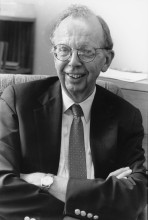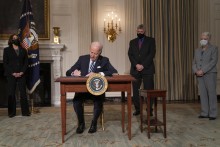Renowned ethicist James M Gustafson dies at 95
Christian ethicist James M. Gustafson died on January 15 at the age of 95.
Gustafson’s 45-year teaching career spanned three institutions: Yale—both in the divinity school and the religious studies department—the University of Chicago, and Emory University. Among his students were ethicists who would go on to have substantial influence of their own, including Stanley Hauerwas, Nigel Biggar, and Lisa Sowle Cahill.
In a tribute written for Emory, former university president James T. Laney said that with Gustafson’s death the world had lost a “towering scholar.”








